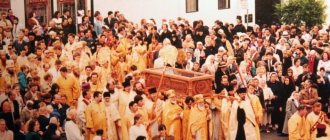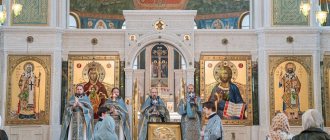Recognize and fulfill (On the relationship between the will of God and man)
“Delight yourself in the Lord, and He will give you the desires of your heart” (Psalm 37:4)
The Lord protects every person so that he can live.
The Lord provides everything for life: clothing, food, shelter.
And if you think about it, the Lord preserves life itself for man so that he has time to turn to God, repent and be saved.
The words of the Lord that not even a hair will be lost from the head without the will of God refer to those who live according to His holy will
The Apostle Paul said so: “... all things work together for good to those who love God, to those who are the called according to His purpose” (Rom. 8:28).
God's providence protects everyone. He also intercedes for us (Rom. 8:34)
And according to the word of the apostle. Paul: “.. godliness is profitable for all things, having the promise of the present life and the life to come” (1 Tim. 4:8).
The idea that fulfilling the will of God is not only the direct, but also the only path to salvation is fundamental for the believer..
Observing human life, we can say along with King David: “Turn away from evil and do good, and you will live forever; For the Lord loves righteousness and does not forsake His saints; they will remain forever; and the seed of the wicked shall be destroyed. The righteous will inherit the earth, and will live in it forever” (Ps. 37:28-29).
The Lord is omnipotent, loves us and wants to lead everyone to salvation. “The world and its lusts pass away, but he who does the will of God abides forever” (1 John 2:17).
Thus, everything happens to the righteous. only by the will of God
Blessed is the man who has faith in God, a living and active faith. “Examine yourselves, are you in the faith? examine yourselves...” says the Apostle Paul (2 Cor. 13:5). Living faith is the kind of faith when our first thought is striving for God; the first feeling is the desire to get closer to God, the first movement of the will is the readiness to fulfill the Divine will.
With those who do not live according to the will of God, everything happens by God’s permission.
The manifestation and implementation of God's will can be carried out in two ways: there is the action of God's will as facilitating, and there is allowing.
The cooperative will of God promotes everything that serves for salvation. But the will of God also has permissive action. People live according to their passions and lusts. This is not God’s will; She does not cooperate with this, but allows it.
This can be expressed figuratively like this: one wants to do good, and the other helps him in this - this is how the will of God works, cooperating. And in another case: one does evil, and the other neither helps nor forbids, stands as if on the sidelines, and does not participate in this - this is how the permissive will of God acts.
In all our manifestations, our human will can and must unite with the will of God, so that we may be one with God in the likeness of the Son of Man Jesus Christ. “Do you not know that I am in the Father and the Father in Me? The words that I speak to you, I do not speak from myself: the Father who abides in me is the one who does the works” (John 4:1).
If we abide in Christ in this likeness and Christ in us, this unity, together with the unity of the Father and the Son, unites us with the will of God.
The will of God is what God requires of people. But, at the same time, the will of God is not only a requirement standing “above” a person or “in front of” a person, but also a mysterious internal influence by which God helps a person to accomplish what he must do.
When a person fulfills the requirement of God's will, he does it not only by his own willpower, but also by that mysterious power, or action of God, which is called grace.
We surrender our souls and bodies to the will of God. “Finally, my brothers, whatever is true, whatever is honorable, whatever is just, whatever is lovely, whatever is admirable, if there is any excellence or if there is anything worthy of praise, think about these things. Whatever you have learned, received, heard, and seen in me, do it, and may the God of peace be with you” (Phil. 4:8).
It follows that the will of God is not only an absolute moral requirement, but also a gift achieved in unity, harmony and interaction of the human will with the will of God.
When God reveals His will, man must not “consult with flesh and blood” (Gal. 1:16), but must follow what is required of him by the Divine calling.
“I appeal to you therefore, brothers, by the mercies of God, to present your bodies as a living sacrifice, holy, acceptable to God, which is your reasonable service. And do not be conformed to this world, but be transformed by the renewing of your mind, so that you may discern what is the good and acceptable and perfect will of God” (Rom. 6:9).
The Orthodox Church teaches and confesses that God’s pre-eternal predestination about the world and man does not exclude or eliminate the personal freedom of the individual. At the same time, God's predestination, understood as God's absolute foreknowledge of everything that happens in time, does not in any way limit the moral freedom of the human person.
“For this is the will of God, your sanctification, that each of you should know how to keep his own vessel in holiness and honor. For God has not called us to uncleanness, but to holiness” (1 Thess. 4:3).
The Lord is omnipotent, loves us and wants to lead everyone to salvation. “And the world passes away, and its lusts, but he who does the will of God abides forever” (1 John 2:17).
The Holy Fathers, speaking about the will of God and the will of man, use the concept of synergy
Synergy (Greek συνεργεια - joint, coordinated action) is a concept of Orthodox theology that affirms the need for collaboration, conformity, coordinated harmony between Divine energy (grace) and human energy (will) in the matter of salvation, the union of man with God (1)
St. John Cassian very definitely expressed the essence of synergy: “In the work of our salvation, both the grace of God and our free will participate ... both act in harmony and are equally necessary in the work of our salvation” (2).
God gave free will and does not save us by force. If everyone fulfilled the will of God in everything, then an ideal state of the world would come: there would be no sinners and no spiritually perishing people. That is why so much in the patristic works is said about fulfilling the will of God. . It is impossible to do this without cutting off your will (3)
We cannot be saved without God's grace, and it is given only to those who act according to the will of God.
God wants good for us more than we want it ourselves.
But the absolute will of God meets an obstacle in the free will of man, which can still fluctuate between good and evil. And here the person himself is already determined.
Free will was originally given to man as the image and likeness of God.
Without the possibility of freedom of choice, good as such would not exist, and a person’s actions and even his internal actions would be guided by necessity.
Free will is one of the main advantages of a person, and at the same time, a huge responsibility for him.
Without free will, human salvation itself cannot be realized.
There is God's providence for the salvation of every person, and there is the only value in this world - life according to the will of God.
In general, “find out the will of God” and “live according to the will of God” are not at all the same thing. It is possible to know the will of God - the Church provides us with a great experience of such knowledge. But living according to the will of God is a personal feat
A person himself must voluntarily choose the path of salvation - to have God as the main goal of his life.
Salvation itself is the love of the Creator for His creation and the creation for its Creator. Therefore, salvation is deeply personal.
As Mikhail Lermontov wrote:
The soul itself is constrained,
Life is hateful, but death is also terrible,
You find the root of torment in yourself,
And the sky cannot be blamed for anything.
The conflict between the divine and human will gives rise to that relative will of God, which is called assumption.
God allows the direction of human will not only towards good, but also towards evil. If God physically stopped evil, then freedom would become a fiction, moreover, all of humanity would be doomed to destruction: after all, each of us committed serious sins, where he was saved only by God’s long-suffering.
Since “there is none righteous, not one…all have sinned and fall short of the glory of God” (Rom. 3:10,23). Only by faith in Jesus can we become righteous: “But to him who does not work, but believes in Him who justifies the ungodly, his faith is counted as righteousness” (Rom. 4:5). For our faith to be counted into righteousness, works are needed, since “faith without works is dead” (James 2:26). These are the essence of these things: not to sin, to obey God, to seek His face, His Kingdom.
Not to sin is not to have the works of the flesh: “... adultery, fornication, uncleanness, lasciviousness, idolatry, sorcery, enmity, quarrels, envy, anger, factions, disagreements, (temptations), heresies, hatred, murder, drunkenness, disorderly conduct, etc. like..." (Gal. 5:19-21). But works are needed: “... love, joy, peace, long-suffering, kindness, goodness, faith, meekness, self-control...” (Gal. 5:22,23) - the fruits of the spirit.
The Venerable John Climacus, in his famous “Ladder,” writes “..that which is from God pacifies the human soul, that which is against God confuses the soul and brings it into a restless state.”(4)
Jesus teaches us to seek the only thing - this is the will of God: “Seek first the kingdom of God and His righteousness, and all these things will be added to you” (Matthew 6:33).
If a person abandons his will, then he too can say: “By my God I will cross the wall. My God, His way is blameless” (Ps. 17:30-31)
It sounds paradoxical, but knowing the will of God is scary.
It is indeed scary to know the will of God, for this knowledge is a colossal responsibility. Let us remember the words of the Gospel: “That servant who knew the will of his master, and was not ready, and did not do according to his will, will be beaten many times; but whoever did not know and did something worthy of punishment will receive less punishment. And from everyone to whom much has been given, much will be required, and to whom much has been entrusted, from him will be required more” (Luke 12:47-48) (5)
The free will of the Lord Jesus Christ, as the will of a perfect Man, followed the Divine will of the Father in everything: “Not what I want, but what You want” (Mark 14:36); “Not my will, but yours be done” (Luke 22:42).
With His teaching, His deeds and His entire life, Christ did not do His will, but the will of the Father who sent Him, which contains the secret of the future general resurrection (John 6:38-40).
Links
1. Khoruzhy S.S. Orthodox asceticism is the key to a new vision of man lib.pravmir.ru/library/readbook/1478ib.
2. St. John Cassian. Interview XIII. 10,11 Scriptures. Holy Trinity Sergius Lavra. 1993.
3. What is my will and the will of God? — www.pravoslavie.ru/answers/6643.htm
4. LADDER OR SPIRITUAL TABLETS of our venerable father JOHN
abbot of Mount Sinai www.wco.ru/biblio/books/ioannl1/Main.htm
5. Archpriest Mikhail Shpolyansky What is the will of God? 19.03. 2006 pravmir..ru
Alexander A. Sokolowski
God's will
Christ prayed alone, but wanted at least the chosen disciples to be with Him in prayer. That is why He says to the apostles and through them to us: “They could not even watch with Me for one hour.” Congregational prayer is always stronger. Christ said: “Truly I also say to you that if two of you agree on earth about anything they ask, it will be done for them by My Father in heaven, for where two or three are gathered in My name, there I am in the midst.” them” (Matthew 18:19–20). It is wonderful and beneficial for us to pray with Christ in the words of His prayer: “Thy will be done!” Pray daily and at least one hour, as He demanded of His disciples.
Only in prayer can we find out God's will for us, what we should do in this or that case. “Reverend Barsanuphius teaches us that if we have no one to consult with, we must pray to God three times, setting out our case, and then observe in which direction the decision of our heart is inclined - at least a little. And then act accordingly. The monk advises praying for three days in a row, but if there is no time, you can pray three times over a short period, imitating the Lord who prayed three times in one night in Gethsemane - with the same words. The Fathers teach us: if we [almost already] believe that our decision corresponds to the will of God, but still experience some doubts, then we must pray especially earnestly. And if during this prayer our heart becomes more and more inclined towards one decision, and doubts simultaneously decrease, then we should take this as a sign that we are acting in accordance with the will of God. In the end, doubts will disappear completely, and we will be left with one single and clear decision” (Sergei Bolshakov. From conversations with Hieroschemamonk Mikhail (Pitkevich)).
In prayer we can receive grace-filled enlightenment from above and strengthening of our strength to accept the good and saving will of God and bear our life's cross. We should pray to come to an understanding of the will of God of the long-suffering Job, with his readiness to accept everything from God: “...The Lord gave, the Lord has taken away! As He pleased, so it was done; Blessed be the name of the Lord!” Spiritually wise people say: “God saves us from bigger troubles with small troubles.” “Sorrow is a good sign; show that we are on a narrow path,” notes St. Joseph Optinsky. “Please keep in mind, when sorrows occur, that it is the Lord who is paving the way for you into His Kingdom, or even more, taking you by the hand and leading you. Therefore, do not rest your feet and do not shout, but endure sorrows complacently and with gratitude,” teaches St. Feofan, the Recluse of Vyshensky.
However, even a firm conviction in the good will of God, together with prayer to God, does not exclude a Christian from seeking help from friends, doctors, lawyers, law enforcement officers, specialists for advice... We can also find similar examples in the Holy Scriptures. Christ said: “When you are persecuted in one city, flee to another” (Matthew 10:23). This means that from several options we must choose the most useful and spiritually saving for us. This is not an easy task, but with God's help it can be solved!
Bishop Job (Smakouz)










